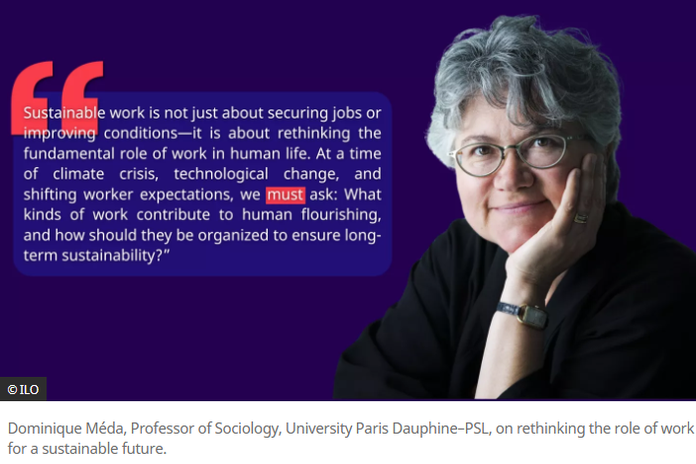By Dominique Méda
Drawing on the latest special issue of the International Labour Review, this blog explores why rethinking the role of work is key to advancing social justice, decent employment, and environmental sustainability in today’s changing world.
The International Labour Review’s Special Issue on sustainable work marks a significant moment in the ongoing effort to redefine what it means for work to be truly sustainable. This collection of cutting-edge research goes beyond conventional discussions of employment protections and decent work, offering a bold, interdisciplinary vision that integrates economic, social, and ecological dimensions. At a time when labour markets are being reshaped by technological change, climate crises, and shifting worker expectations, the insights presented here are more urgent than ever.
For decades, employment protection legislation has been weakened in favour of labor market flexibility, yet these reforms have often failed to consider the broader implications for workers and society. This Special Issue brings forward a crucial and timely perspective: sustainable work is not merely about securing jobs or improving conditions but about rethinking the fundamental role of work in human life. It challenges us to move past narrow policy debates and instead ask deeper questions: What kinds of work contribute to human flourishing? How should work be organized to ensure long-term sustainability? And what role should workers themselves play in shaping these decisions?
One of the key contributions of this Special Issue is its exploration of the evolution of sustainable work as a concept. Initially framed within a socio-technical perspective, it was primarily concerned with mitigating the intensification of labor. Over time, however, the ecological dimension—which was weak even in early research—disappeared almost entirely. The articles featured here push back against this omission, arguing that sustainable work cannot be fully understood unless we recognize the depletion of both human and natural resources as interconnected crises. Sustainable work, as envisioned in this issue, integrates social and ecological sustainability, expands the boundaries of what we consider work, and acknowledges the global interdependencies that shape labour conditions today.
The proposals advanced in these articles are ambitious. They go beyond the traditional focus on “green jobs” and “decent work” to call for a re-politicization of work itself. As Herzog and Zimmermann argue in their contribution, sustainable work must encompass both productive and reproductive activities—those that sustain human life and the environment—while also fostering the capacities that allow individuals and societies to thrive. This means giving workers a voice not just in how they work, but in what is produced and for what purpose. It means rethinking corporate governance, labour rights, and economic structures to ensure that work serves broader societal and ecological goals.
This raises pressing questions: How can workers participate in collective deliberation about the nature of their work? What legal frameworks are needed to make sustainable work a global priority? Can enterprises be democratized in ways that empower workers to shape both their conditions and the impact of their labour? And what role should trade unions play in this transformation? The articles in this Special Issue offer a rich foundation for tackling these critical debates.
At its core, this Special Issue is a call for a fundamental rethinking of work—one that acknowledges the deep connections between economic production, social well-being, and environmental sustainability. By expanding and refining the concept of sustainable work, these contributions pave the way for labour policies and workplace practices that do not simply mitigate harm but actively contribute to a more just and livable world. The ILR is proud to present this Special Issue as a landmark contribution to the field, and we hope it will inspire further research, policy innovation, and meaningful change.





